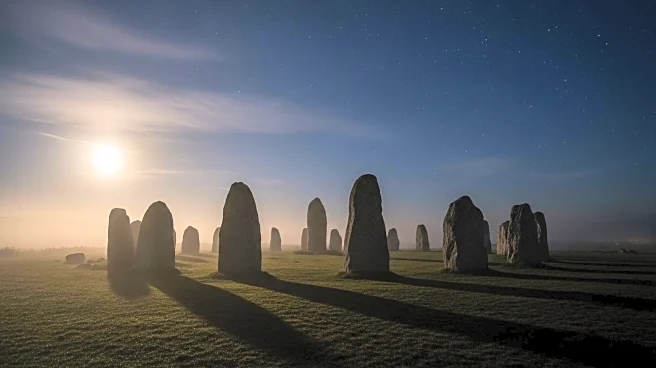What's Happening?
Ken Follett, renowned for his historical novels, has released a new book titled 'Circle of Days,' which imagines the creation of Stonehenge. Follett, known for 'The Pillars of the Earth,' takes readers back to Neolithic times, exploring the lives of craftsmen, entrepreneurs, and mystics who contributed to the construction of the iconic monument. The novel delves into the challenges faced by these early builders, including resource scarcity and tribal conflicts. Follett's approach combines historical research with creative deduction, offering a vivid portrayal of life thousands of years ago. The book maintains Follett's signature style of direct prose, focusing on the simplicity and harsh realities of the era.
Why It's Important?
Ken Follett's 'Circle of Days' provides a unique perspective on the construction of Stonehenge, a subject that has fascinated historians and archaeologists for centuries. By blending historical facts with imaginative storytelling, Follett offers readers a deeper understanding of the cultural and societal dynamics of Neolithic Britain. This novel not only entertains but also educates, shedding light on the ingenuity and resilience of early civilizations. Follett's work continues to influence the genre of historical fiction, inspiring both readers and writers to explore the complexities of human history through narrative.
What's Next?
With the release of 'Circle of Days,' Ken Follett is likely to engage in promotional activities, including interviews and book tours, to discuss the themes and historical context of his latest work. The novel may spark renewed interest in Stonehenge, potentially leading to increased tourism and scholarly research on the monument. Follett's fans and new readers alike will be eager to see how he continues to explore historical themes in future projects, possibly expanding his focus to other ancient wonders or civilizations.
Beyond the Headlines
Ken Follett's exploration of Stonehenge in 'Circle of Days' raises questions about the intersection of history and fiction. The novel prompts readers to consider the ethical implications of reconstructing historical narratives, especially when evidence is sparse. Follett's work highlights the importance of imagination in understanding the past, encouraging a dialogue between historians, archaeologists, and writers about the role of storytelling in preserving cultural heritage.









